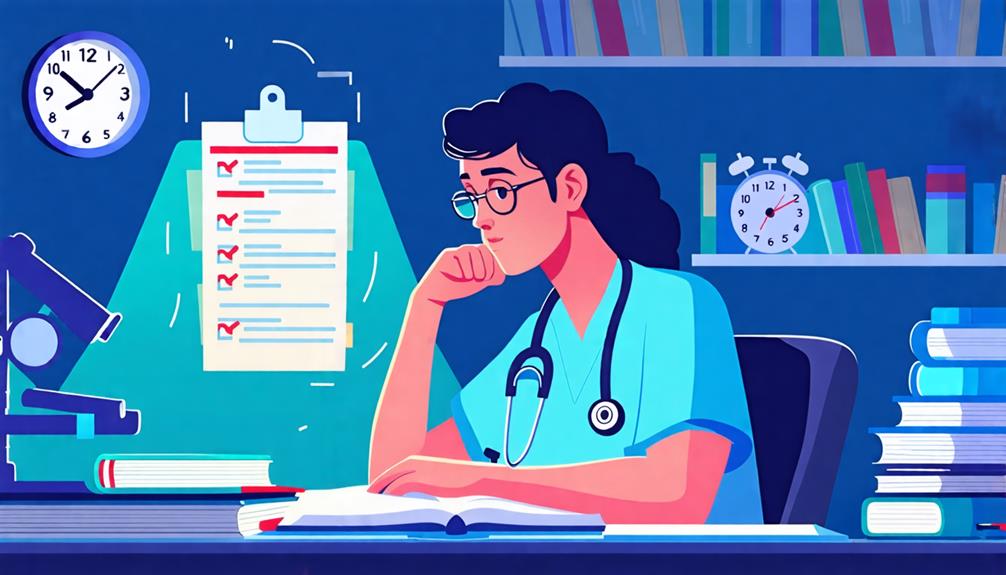
Yes, a medical technology degree can be quite tough. You'll tackle a variety of challenging subjects like biochemistry, microbiology, and clinical chemistry. There's also a strong emphasis on both theoretical knowledge and practical skills, where you'll spend many hours in labs mastering techniques such as staining and molecular analysis. Plus, the degree requires sharp critical thinking skills to interpret complex data and make informed decisions for patient care. But with good time management and a solid support system, you'll handle these challenges effectively. Exploring further will provide you with deeper insights into navigating these demands successfully.
Understanding the Curriculum

To grasp the complexity of a Medical Technology degree, you'll first need to understand its comprehensive curriculum. It's structured to provide you with a deep understanding of both the theoretical and practical aspects of healthcare science. You'll dive into a variety of subjects that span biology, chemistry, microbiology, and physiology. Each course is designed to equip you with the knowledge you need to analyze and interpret medical tests effectively.
You'll also tackle specialized subjects like hematology, clinical chemistry, and immunology. These courses aren't just about memorizing facts; they're about understanding how these disciplines interact within the human body and how they're applied in real-world diagnostics. This multidisciplinary approach ensures you're not just learning in silos but integrating this knowledge to solve complex medical puzzles.
Moreover, your education won't just be confined to textbooks. You'll study current medical research and case studies, helping you stay updated with advancements in medical technology. This integration of up-to-date research ensures that your skills remain relevant in the rapidly evolving field of healthcare.
Understanding this curriculum is crucial. It's rigorous and demanding but designed to prepare you thoroughly for a career in medical technology.
Laboratory Workload and Requirements
Now let's explore the laboratory workload and requirements integral to your training in medical technology. You'll find that the practical component of your degree isn't just a complement to your studies—it's a core part. Expect to spend hours in labs every week, handling sophisticated equipment and conducting experiments that are crucial to your understanding of the field.
You'll need to master various techniques such as staining, culturing, and molecular analysis. Each lab session isn't just about following a set of instructions; you'll be expected to meticulously prepare, execute, and often, present your findings.
This means you're not only learning the 'how' but also understanding the 'why' behind each procedure. Your ability to manage time effectively will be tested. Labs have strict schedules, and you'll often juggle multiple experiments simultaneously.
Precision is paramount—small errors can mean repeating a procedure, costing you time and resources. Safety protocols are strict and non-negotiable because you're frequently handling biohazards or chemical reagents.
As challenging as it may seem, this intensive lab work is essential. It builds your competence and confidence, preparing you for the demanding pace and high standards expected in the medical technology field.
Theoretical Knowledge and Practical Skills

While laboratory work hones your practical abilities, a solid grasp of theoretical knowledge is crucial to excel in medical technology. You'll find that understanding complex concepts in biochemistry, microbiology, and pharmacology isn't just about memorizing facts; it's about integrating this knowledge to solve real-world problems you'll encounter in the lab.
As you dive deeper, you'll need to be comfortable with advanced topics such as molecular diagnostics and clinical chemistry. These subjects form the backbone of your ability to analyze and interpret laboratory results accurately. It's not just about doing the tests; it's about understanding what the results mean for a patient's health.
On the practical side, you'll need to master various techniques and technologies. From handling microscopes and centrifuges to mastering sophisticated software used for data analysis, your hands-on skills will be put to the test. You'll also learn to perform and troubleshoot experiments, a daily reality in medical labs.
Balancing these aspects can be challenging, but it's also what makes the field so rewarding. As you grow in your career, the blend of theoretical knowledge and practical skills ensures you're not just competent, but also versatile and highly valued in the field of medical technology.
The Role of Critical Thinking
Beyond mastering theoretical knowledge and practical skills, you'll also need to sharpen your critical thinking abilities to excel in medical technology. This isn't just about solving problems; it's about analyzing complex data sets, interpreting results, and making informed decisions that could significantly impact patient care.
Critical thinking in this field means you'll often assess the validity of diagnostic tests, weighing potential outcomes against current knowledge. You're not just following a set of instructions; you're constantly questioning, why this test? What do these results imply? How reliable are these findings in the context of this patient's history?
This level of scrutiny is crucial because medical technology isn't black and white. You'll face ambiguous situations where the best course of action isn't clear-cut. Here, your ability to think critically becomes invaluable, guiding you to consider various perspectives and possibilities before arriving at a conclusion.
Moreover, your critical thinking skills will help you stay abreast of technological advancements and adapt to new tools and techniques that could revolutionize diagnostic processes. This adaptability ensures you're not just competent in your field but also a pivotal part of the evolving landscape of healthcare.
Balancing Academic and Personal Life

Managing your time effectively is key to maintaining a healthy balance between your studies in medical technology and your personal life. As a student in this demanding field, you'll find that your coursework, lab sessions, and exams can consume a significant portion of your time. It's crucial to develop time management skills early on to ensure you're not only meeting academic demands but also taking care of your well-being.
Start by creating a structured schedule that allocates specific times for studying, attending classes, and completing assignments. Don't forget to include regular breaks and downtime to recharge. Prioritizing tasks based on their urgency and importance can help you tackle the most critical tasks first.
Remember, it's okay to say no to certain social events if it means you can focus on your studies or simply rest. However, maintaining social connections is important, so try to integrate social activities into your schedule where possible.
Lastly, don't underestimate the power of a support system. Whether it's family, friends, or fellow students, having people to talk to and lean on can make a huge difference in managing stress and staying motivated.
Balancing your academic and personal life isn't easy, but with the right strategies, you can make it work.
Perspectives From Students and Graduates
Hearing directly from students and graduates can give you a clearer picture of the challenges and rewards of pursuing a degree in medical technology. They've been where you're now and understand the ins and outs of the program. Here's what they've to say.
“It's tough, no doubt,” admits Jenna, a recent graduate. “You'll need to be good at juggling intense courses and long lab hours. But it's also hugely rewarding. The sense of accomplishment you feel when you master a complex technique is incredible.”
Mark, another alum, emphasizes the practical application of the degree. “You're not just learning theory; you're applying it. That means when you walk into your first job, you're really prepared. It's hard work, but it pays off.”
Current student, Luis, offers a tip: “Stay organized and don't fall behind. It's easier to keep up than to catch up. Make sure you're clear on the concepts as you go.”
Their experiences highlight a blend of challenge and opportunity. You'll work hard, but with dedication, you'll emerge well-equipped to thrive in the medical technology field.
Frequently Asked Questions
What Certifications Are Needed for a Career in Medical Technology?
To pursue a career in medical technology, you'll need certifications like ASCP or AMT. These validate your skills and knowledge, essential for working in labs and with complex medical equipment.
Are There Online Programs for Medical Technology Degrees?
Yes, you can find online programs for medical technology degrees. They offer flexibility while providing the necessary coursework and practical experiences essential for your future career in the medical technology field.
How Does a Medical Technology Degree Differ From Nursing?
A medical technology degree focuses on lab skills and diagnostics, while nursing centers on patient care and treatment. You'll find more hands-on patient interaction in nursing compared to the technical emphasis in med tech.
What Are Common Career Paths for Medical Technology Graduates?
As a medical technology graduate, you can explore careers in clinical laboratories, research facilities, biotechnology firms, and public health organizations. Opportunities also exist in pharmaceuticals, forensic science, and educational roles.
Can I Work While Pursuing a Medical Technology Degree?
You can work while pursuing a medical technology degree, but it's important to manage your time effectively. Balancing coursework and a job requires careful planning to ensure you don't overwhelm yourself.
Conclusion
As you delve into a medical technology degree, remember, it's challenging yet rewarding. Balancing intense lab work and complex theories will demand a lot from you, but developing critical thinking and practical skills will be invaluable.
Don't underestimate the importance of managing your time and seeking support when needed. Listen to those who've walked this path before; their insights are golden.
Stay dedicated, and you'll navigate this journey successfully, emerging as a skilled professional ready to make a significant impact.






